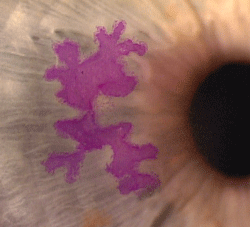What is Herpes Simplex Virus (HSV)?
There are two types of Herpes simplex virus (HSV), HSV-1 and HSV-2. HSV-1 is extremely common and is responsible for eye infections and cold sores around the lips and mouth. HSV-2 is a sexually transmitted disease that causes genital ulcers and rarely affects the eye. Both are transmitted from one infected individual to another through direct physical contact.
In a typical bacterial infection, our body is able to kill and permanently eliminate all bacteria from our system. Our immune systems cannot, however, completely destroy the herpes virus. Following a herpetic infection, our defenses force the virus into a form of hibernation where it can hide dormant for many years. An outbreak of the virus may occur during situations when the immune system is suppressed from various causes including infection, stress, or with certain medications.
How does HSV affect the eye?

HSV-1 eye infection can cause conjunctivitis, iritis or keratitis. Patients with HSV keratitis typically present with a red painful eye, blurred vision, and clear watery discharge. Herpes simplex keratitis is a corneal infection that is typically limited to the epithelium, the cornea’s outer protective layer. Rarely, the virus can spread into the corneal stroma (stromal keratitis). Stromal keratitis can progress quickly and cause severe vision loss from corneal scarring.
How is HSV Keratitis diagnosed and treated?
HSV keratitis should only be managed by an eye doctor since misdiagnosis and treatment can cause permanent vision loss. The diagnosis is made using a microscope (slit lamp) and specialized stains to highlight the corneal infection.
HSV keratitis is treated with anti-viral eye drops (Trifluridine ophthalmic or Zirgan gel) that have been formulated to help the immune system fight off the viral infection. Oral antiviral medications (acyclovir, valacyclovir, or famciclovir) are rarely used when topical drugs are unavailable.
Stromal keratitis is treated with oral antiviral medications in addition to topical steroids. Permanent corneal scarring or corneal perforation can cause serious vision loss that may require corneal transplant surgery.
Treatment can last for weeks to months. The long-term prognosis is usually good with proper diagnosis and timely treatment. Because the virus is never completely eliminated from the body, patients may develop recurrent keratitis over the years. Oral medication may help prevent recurrences for those with a history of multiple outbreaks.



